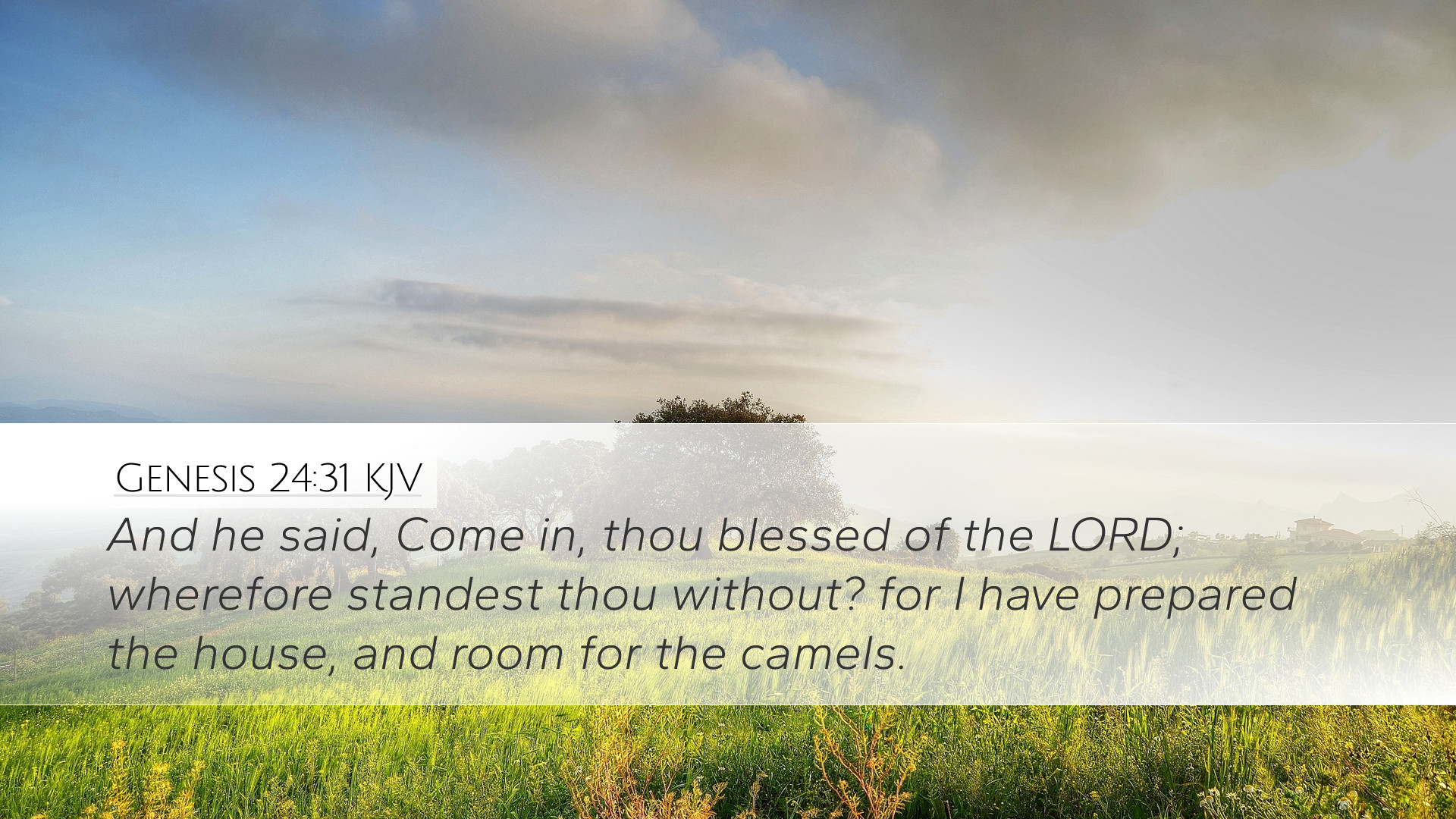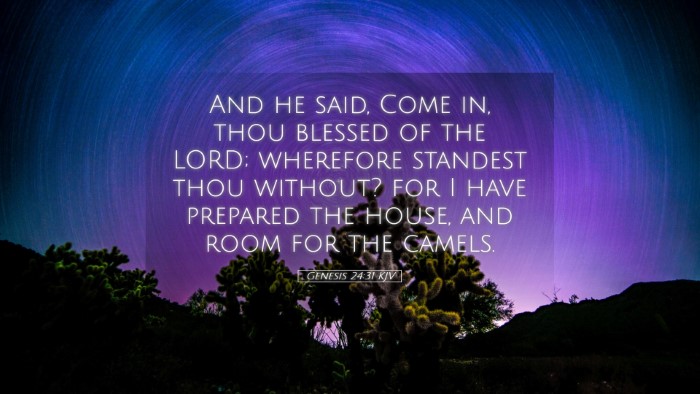Commentary on Genesis 24:31
Verse: Genesis 24:31 - "And he said, Come in, thou blessed of the Lord; wherefore standest thou without? for I have prepared the house, and room for the camels."
Introduction
Genesis 24:31 presents a fascinating scene in the narrative of Abraham's servant finding a wife for Isaac. The verse encapsulates the themes of hospitality, divine providence, and the fulfillment of God's promises. In this commentary, we will explore insights from well-respected public domain commentators, including Matthew Henry, Albert Barnes, and Adam Clarke, to offer a thorough analysis suitable for pastors, students, theologians, and Bible scholars.
Contextual Background
This verse appears within a larger narrative where Abraham's servant is on a mission to find a suitable wife for Isaac from among his relatives in Mesopotamia. The servant had prayed for guidance and was led to Rebekah. Upon meeting, the servant identifies her as the answer to his prayer. Laban's warm welcome reflects both cultural hospitality practices and the favor of God upon the servant's journey.
Detailed Analysis
Hospitality and Divine Favor
Matthew Henry notes the significance of hospitality in ancient Near Eastern culture, articulating that Laban's invitation illustrates the prevailing custom of welcoming guests, particularly those perceived as divinely blessed. When Laban refers to the servant as "thou blessed of the Lord," he recognizes the servant's mission as divinely ordained, suggesting that the blessings of God accompany the messenger, highlighting the spiritual significance of the events taking place.
Obedience and Preparation
According to Albert Barnes, Laban's eagerness to welcome the servant correlates with the servant’s readiness and preparation for his journey. Barnes emphasizes the importance of being prepared for the tasks God sets before us, as seen in the servant's organized approach to finding a wife for Isaac. This readiness resonates with the theme of faith in action, where identifying God’s blessings requires both action and attentiveness to divine signs.
Symbolism of the Coming In
Adam Clarke draws attention to the act of coming into the house as a symbolic gesture. He interprets Laban's invitation as indicative of God opening doors for those who faithfully seek His will. The phrase "wherefore standest thou without?" can be seen as a metaphor for the transition from isolation to fellowship, reflecting how God desires His people to be in community and relationship with Him and each other. This moment serves as a potent reminder of God's hospitality towards humanity.
Theological Implications
This verse functions as a microcosm of God's overarching narrative of redemption. In recognizing the servant as a divine instrument, we see how God orchestrates events across generations to fulfill His promises. The emphasis on preparation and divine favor ingrains a vital lesson for modern readers: the necessity of seeking God’s guidance, preparation for His service, and the openness to divine encounters that can alter the course of our lives.
Application for Pastors and Theologians
For pastors and theologians, the implications of Genesis 24:31 extend to ministry practice. It encourages leaders to cultivate an environment of hospitality, acknowledging the divine presence in congregational interactions. It also offers insights into seeking God's favor and guidance in decision-making processes. The notion that our plans and preparations can align with His will serves as a foundational principle in pastoral care and church leadership.
Reflection for Students and Scholars
Students and scholars of theology can reflect on the narrative techniques employed in Genesis. The dramatic tension and reliance on divine providence in this passage serve as a case study for analyzing biblical narrative structures. Furthermore, the theological themes introduced here provide a fertile ground for research on the nature of God’s providence and the role of human agency in the fulfillment of divine promises.
Concluding Thoughts
Genesis 24:31 is a rich tapestry of theological insight, cultural significance, and practical application. Through the perspectives of Henry, Barnes, and Clarke, we find a confluence of thoughts that reinforce the sacredness of hospitality, the importance of being prepared for God's work, and the recognition that every encounter is steeped in divine purpose. For the believer, this passage serves as a reminder that God is intricately involved in our lives, guiding us towards fulfilling His plan.


